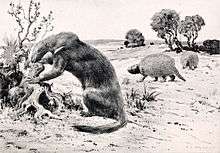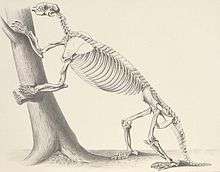Hapalops
| Hapalops Temporal range: Late Oligocene–Miocene | |
|---|---|
| | |
| Hapalops ruetimeyeri | |
| Scientific classification | |
| Kingdom: | Animalia |
| Phylum: | Chordata |
| Class: | Mammalia |
| Order: | Xenarthra |
| Family: | †Megatheriidae |
| Subfamily: | †Schismotheriinae |
| Genus: | Hapalops Ameghino, 1887 |
| Species | |
| |
Hapalops is an extinct genus of ground sloth from the late Oligocene to Miocene of Brazil, Bolivia and Argentina in South America.

Life restoration of Hapalops longiceps and Propalaehoplophorus australis

Skeleton
Though related to the giant Megatherium, Hapalops was much smaller, measuring about 1 metre (3.3 ft) in length. Like most extinct sloths it is categorized as a ground sloth, but it is believed that the smaller size of Hapalops allowed it to engage in some climbing behaviors.[1]
Description
It had a robust body, short skull and long limbs with large, curved claws. When it did visit the ground the animal probably walked on the knuckles of its forelimbs, like a gorilla. Hapalops had very few teeth with no incisors, the mandible included only four pairs of teeth.[2][3]
References
- ↑ White, J. 1993. Indicators of locomotor habits in Xenarthrans: Evidence for locomotor heterogeneity among fossil sloths. Journal of Vertebrate Paleontology, 13(2): 230-242
- ↑ Palmer, D., ed. (1999). The Marshall Illustrated Encyclopedia of Dinosaurs and Prehistoric Animals. London: Marshall Editions. p. 207. ISBN 1-84028-152-9.
- ↑ "404 - File or directory not found" (in Spanish). Retrieved August 10, 2015.
This article is issued from Wikipedia - version of the 10/20/2016. The text is available under the Creative Commons Attribution/Share Alike but additional terms may apply for the media files.